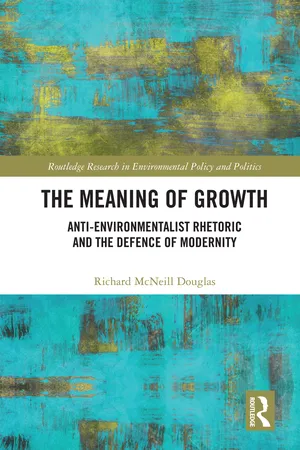
The Meaning of Growth
Anti-Environmentalist Rhetoric and the Defence of Modernity
- English
- ePUB (mobile friendly)
- Available on iOS & Android
The Meaning of Growth
Anti-Environmentalist Rhetoric and the Defence of Modernity
About this book
Since the Limits to Growth report was published in 1972 it has been widely known that a commitment to endless growth was putting us on course for environmental disaster—so why have we failed to take decisive political action in the half-century since then? In The Meaning of Growth, Richard McNeill Douglas uses interpretive social science to uncover the cultural roots of political resistance to environmental science and policy.
Through a close reading of anti-environmentalist rhetoric the book identifies its idolisation of growth as a defence of a modern (Western-European) world-view, focusing on values of freedom, power, and immortality. The significance of these findings is drawn out by applying the 'secularisation thesis', a theoretical account of the development of a modern understanding of reality from a theological world-view to which it is ostensibly opposed. This framework is used to offer a deep interpretation of what is at stake in environmental debate: that to accept there are limits to growth means abandoning crucial elements of a faith in a theodicy of progress that makes life meaningful in a secular age. Douglas concludes by suggesting that the precondition for political action on the environment is a change of philosophical perspective that provides for a sense of meaning in a world of limits.
This book should be of interest to academics in the fields of environmental sociology and communications studies, as well as activists interested in understanding the motivations of anti-environmentalist campaigners and how to counter their influence.
Frequently asked questions
- Essential is ideal for learners and professionals who enjoy exploring a wide range of subjects. Access the Essential Library with 800,000+ trusted titles and best-sellers across business, personal growth, and the humanities. Includes unlimited reading time and Standard Read Aloud voice.
- Complete: Perfect for advanced learners and researchers needing full, unrestricted access. Unlock 1.4M+ books across hundreds of subjects, including academic and specialized titles. The Complete Plan also includes advanced features like Premium Read Aloud and Research Assistant.
Please note we cannot support devices running on iOS 13 and Android 7 or earlier. Learn more about using the app.
Information
Table of contents
- Cover
- Endorsements
- Half Title
- Series
- Title
- Copyright
- Contents
- Foreword
- Acknowledgements
- Prologue: 1972—The high-water mark of modernity
- Introduction: the question mark
- 1 An irrational denial of limits?
- 2 Interpreting the denial of limits: the secular theodicy of modernity
- 3 Growthism vs limitism: a new analysis of environmental discourse
- 4 Freedom: the good life according to growthism
- 5 Power: the economy in mind
- 6 Immortality: growth against death
- Conclusion: limits and transcendence
- Index